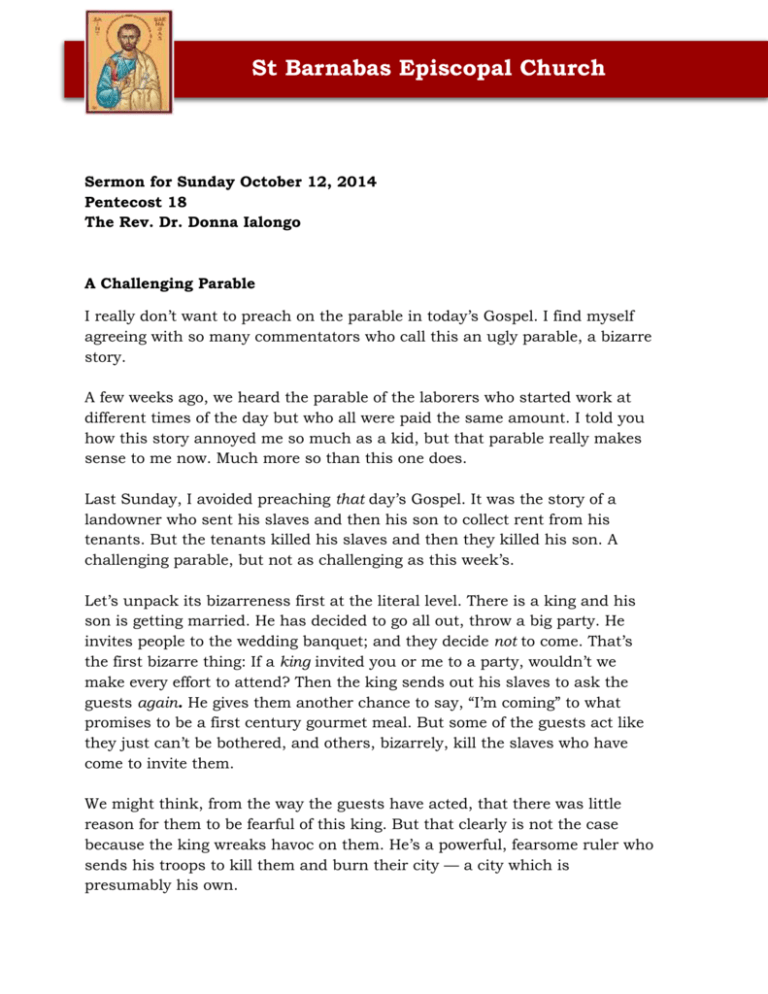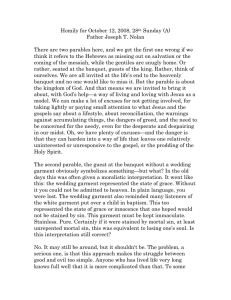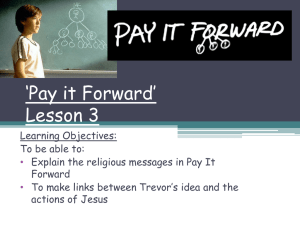A Challenging Parable
advertisement

St Barnabas Episcopal Church Sermon for Sunday October 12, 2014 Pentecost 18 St Barnabas Episcopal Church The Rev. Dr. Donna Ialongo A Challenging Parable I really don’t want to preach on the parable in today’s Gospel. I find myself agreeing with so many commentators who call this an ugly parable, a bizarre story. A few weeks ago, we heard the parable of the laborers who started work at different times of the day but who all were paid the same amount. I told you how this story annoyed me so much as a kid, but that parable really makes sense to me now. Much more so than this one does. Last Sunday, I avoided preaching that day’s Gospel. It was the story of a landowner who sent his slaves and then his son to collect rent from his tenants. But the tenants killed his slaves and then they killed his son. A challenging parable, but not as challenging as this week’s. Let’s unpack its bizarreness first at the literal level. There is a king and his son is getting married. He has decided to go all out, throw a big party. He invites people to the wedding banquet; and they decide not to come. That’s the first bizarre thing: If a king invited you or me to a party, wouldn’t we make every effort to attend? Then the king sends out his slaves to ask the guests again. He gives them another chance to say, “I’m coming” to what promises to be a first century gourmet meal. But some of the guests act like they just can’t be bothered, and others, bizarrely, kill the slaves who have come to invite them. We might think, from the way the guests have acted, that there was little reason for them to be fearful of this king. But that clearly is not the case because the king wreaks havoc on them. He’s a powerful, fearsome ruler who sends his troops to kill them and burn their city — a city which is presumably his own. Then the king, whom you would think would be a bit unsettled by all the mayhem, decides the party’s still on and tells his slaves to go out into the city and invite everyone they find to the wedding banquet. And they do find new guests, both good people and bad. Then the most bizarre thing happens. The wedding hall is finally filled with all these new guests, but, when the king enters, he notices that one of them is not wearing a wedding robe. And, bizarrely, he tells his slaves to bind the man head and foot and throw him into the outer darkness, where there will be weeping and gnashing of teeth. And we ask, “But wasn’t this man probably poor and destitute? Would he have even owned a wedding garment? In fact, how could any of these people, pulled in off the street, be in a wedding garment?” It’s a very difficult story on a literal level. So now, let’s look at it another way. Let’s look at the context of this story and its allegorical nature: what was going on when it was written? Matthew, you probably recall, is writing primarily for a Jewish audience, probably around 80-90 A.D. He is writing for a small group of Jews who did not yet call themselves Christians. It’s too early for that. They would have been faithful Jews, who found themselves At odds with the Jewish community around them, the local synagogue that did not hold that Jesus was the Messiah. These differences between the two Jewish communities would have pitted brother against brother, friend against friend. Matthew’s readers would have been on edge, would have understood that their beliefs might cause rifts with dire consequences. Matthew wrote this parable down after a devastating Jewish-Roman war had ended in 73 A.D., a war in which Jerusalem and the Temple were destroyed. Matthew’s readers would have seen this devastation as the price paid by the Jewish community that had rejected Jesus. Allegorically, they would have seen the devastation of Jerusalem reflected in the parable in the king’s destruction of the city. The invitation in the parable to the people in the streets to join the wedding feast would have confirmed for them their own role as outsiders who had been invited to the banquet of the Kingdom of God. 2 There is yet another level for viewing this parable. The story has, sadly, been used over the centuries to support anti-Semitism. However, what is being described in this parable is not a dispute between Christians and Jews. But the passage has been a proof text for the persecution of Jews by Christians for whom the man without the wedding garment becomes the Jews who are to be thrown into the darkness where there is only weeping and the gnashing of teeth. This dark, horrible place is allegorical for condemnation at the Last Judgment. What are we to do with this difficult story? I had to turn to David Lose, one of my favorite New Testament scholars and president of Luther Seminary in Philadelphia. Lose points out that just as this little first century Jewish community found itself at odds with their brothers and sisters who did not see Jesus as the Messiah, we practicing Christians often find ourselves at odds with those we love: siblings, children, grandchildren, and friends who do not believe what we believe, who only go through the doors of a church for weddings and funerals. We Christians are so often sure that the lives of our loved ones would be much better if they just found Jesus as we have. We may cajole them, argue with them, guilt them, and do our best to manipulate them back into church. Lose points out that our only choices in these situations may seem to be either to condemn our loved ones who believe differently (or not at all) or to feel like “we are somehow being unfaithful by not condemning them.” Rather than be religious control freaks, Lose suggests that we listen to the Good News in this story, the news that God is inviting everybody, the good and the bad. Yes, our God is a God of “expansive love and radical inclusiveness.” We who know this have seen in our own lives just how far God will go with grace. We must trust and believe that God’s grace and forgiveness will also surround those we love. But first, let’s make sure we Christians have that wedding garment on. We need to do more than just show up for the banquet. We need to act out of love and forgiveness. We need to step aside from fear. If we pray for our loved ones who seem lost, if we trust that God will care for them in the same way God has cared for us, we may discover, as David Lose contends, that we become more capable of sharing why what we believe is 3 important to us (rather than just insisting that believing is what matters). Lose goes on: “We might respect the questions, beliefs, and struggles of those we love. And we might offer our care and support in the name and example of the one who died rather than condemn and was raised to offer peace rather than retribution. And,” he says, “This patient understanding and loving support, as it turns out, may just be the most powerful witness we can offer.” This will not be easy. Is there anything so difficult as watching those we love Refuse to make choices that will lead them to wholeness? Trust in God and extraordinary patience are the wedding garment we must put on for the party. Trust that God’s love enfolds all those we love and patience that covers them and us with the peace of God which surpasses all understanding. AMEN. 4





